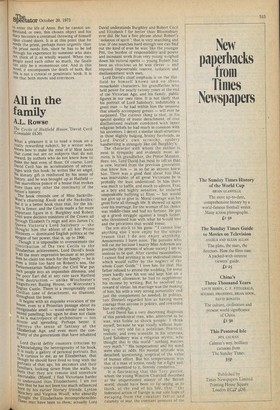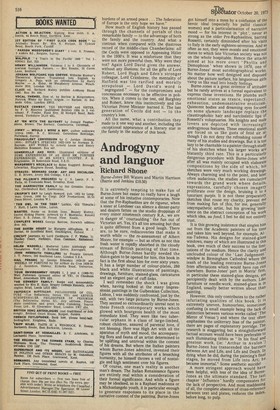All in the family
A.L. Rowse
r,tie Ceeils of Hatfield House, David Cecil (Constable £4.50) What a pleasure it is to read a book on a really rewarding subject, by a writer who Tows how to make the most of it! Most books that come out are on subjects that do not reward, by authors who do not know how to Make the best even of them. Of course, Lord bavid Cecil has an accumulation of advanktages with this book: he writes like an angel, knis literary gift is reinforced by his sense of LtstorY, and he was brought up at Hatfield — that marvellous palace of a house that evokes More than any other the continuity of the nation's history. The book reminds one of Miss SackvilleWest's charming Knole and the Sac:Wiles; but it is a better book than that, for the histnrY is firmer, and the Cecils made a far more PPortant figure in it. Burghley and Robert 'ecil were decisive ministers of the Crown all through Elizabeth l's reign and into James l's; QUeen Victoria's Lord Salisbury — she ',thought him the ablest of all her Prime ministers — dominated English politics at the apogee of her power, that is, up to 1900. ;Though it is impossible to overestimate the ehontribution of the two Cecils to the ,'Itzabethan achievement, Lord David's book all the more impressive because at no point "c'es he claim too much for the family — he is ehven a little too hard on Robert's son, the rarliamentarian Salisbury: the Civil War put ch people into an impossible dilemma, and ,Ll'a Poor Earl did at any rate save Hatfield ...`ranl destruction — unlike Winchester's "agnificent Basing House, or Worcester's naglan Castle. There is a recognisably cool Lecilian tone of detachment, no illusions, throughout the book. It begins with an exquisite evocation of the ho use, even to a Proustian passage about its ,..'ecognisable smell — wood-smoke and beesn'axed panelling; but again he does not claim as a masterpiece of architecture — too ulverse and spreading. Perhaps better, it ,onveys the sense of fantasy of the '',.lizabethah Age, and even more the conunuity of the generations that have inhabited Lord David deftly counters criticism by acknowledging the heterogeneity of his book, It is , really a gallery of personal portraits. But !t is curious to me, as an Elizabethan, that though he should have lived so long with the portraits of that age, his ancestors and their ,,aMiliars, looking down from the walls, he !eels that they are remote and somehow Inscrutable. (Myself, I find Victorians harder tO understand than Elizabethans). I am not Sure that he has not been too much influenced t„lere by his earlier literary friends, Lytton ..trachey and Virginia Woolf, who absurdly 4,n,_ought the Elizabethans incomprehensible. .nese may have been to them; actually Lord
David understands Burghley and Robert Cecil and Elizabeth I far better than Bloomsbury ever did. He has a fine phrase about Robert's 'isolation of spirit ': that is very searching and true. If one searches hard enough one can find out the kind of man he was: like the younger Pitt, the burden of responsibility and power and incessant work from very young weighed down his natural spirits — young Robert had been as vivacious as he was clever — and imposed impenetrable reserve, isolation and disillusionment with men.
Lord David's chief emphasis is on the Hatfield he himself knows and on those remarkable characters, his grandfather who held power for nearly twenty years at the end of the Victorian Age, and his family, public figures in our own time. It is not likely that his portrait of Lord Salisbury, indubitably a great man — he had within him the tensions that usually accompany genius — will ever be surpassed. The curious thing is that, in his special quality of ironic detachment, of cool disillusioned realism combined with inner religious beliefs he had much in common with his ancestors. I detect a similar skull-structure. in those slightly bulging, brainy foreheads, as Lord David's own scratchy, spidery handwriting is strangely like old Burghley's.
The character with whom the author is most in sympathy and evidently most admires, is his grandfather, the Prime Minister. Here, too, Lord David has most to tell us that is new, learned from the previous generation that knew him — in so far as anyone knew him. There was a good deal about him that was inscrutable: of all great Victorians he is probably the least understood. In him there was much to baffle, and much to admire. Frail as a boy and highly sensitive, he endured unspeakable bullying at Eton — but would not give up or give in. Moral courage was his great forte all through life. It showed up again over his marriage, for the woman of his choice was middle-class and had no fortune. He put , up a grand struggle against a tough father, who threatened him with what he Would lose and the privations that would ensue.
The son stuck to his guns: " I cannot lose anything else I now enjoy for the Simple reason that 1 do not enjoy anything.
Amusements I have none. The persons who will cut me because I marry Miss Alderson are
precisely the persons of whose society I am so anxious to be quit. After careful examination, I cannot find anything in my individual tastes
which would suffer by the neglect of the
whole Court Guide." I love him for that. His father refused to attend the wedding, for some
years hardly saw his son and kept him on a very short allowance; he had to supplement his income by writing. But he received the reward of virtue: his marriage was the making of him, his wife a very strong personality and just the complement he needed. In politics,
too: Disraeli regarded him as having more courage than anyone in politics, and rewarded him accordingly. Lord David has a very discerning diagnosis of this paradoxical man, who, aristocrat as he
was, was liable to shock people: I think myself, because he was totally without humbug — very odd for a politician. Practical, realistic, and even scientific in his interests,
Lord Salisbury was a religious mystic, who thought that in this world "nothing matters eery much." "His temperament and his mind were also at odds. His mental attitude was detached, questioning, sceptical of the value of human effort. But his temperament was that of a man of action, ready for alight and, once committed to it, fiercely combative."
It is fascinating that this Tory patriot. whom the young Winston Churchill described as the unquestioned master of the British
world, should haVe been so far-seeing as to think, at the end of his life, that "the federated action of Europe is our sole hope of escaping from the constant terror and calamity of war, the constant pressure of the
burdens of an armed peace ... The federation of Europe is the only hope we have."
How much of English history has passed through the channels of portars of this remarkable family — to the advantage of both the family and the country. And what a contrast when compared with the diastrous record of the middle-class Chamberlains: all the Cecils were opposed to Appeasing Hitler in the 1930's. It was a‘ misfortune that they were not more powerful then. Why were they not? Again Lord David gives the answer, without any illusions: for all the gifts of Lord Robert, Lord Hugh and Eden's stronger colleague, Lord Cranborne, the mentality of Hatfield was too rarified and morally scrupulous — Lord David's word is " segregated " — for the compromises and concessions necessary to be effective in politics. When it comes to the test, old Burghley and Robert, knew this instinctively and the Victorian Prime Minister learned it. The last generation of Cecils did not — to the country's loss.
All the same, what a contribution they made to it one way and another, including the exceptional appearance of a literary star in the family in the author of this book.



































































 Previous page
Previous page